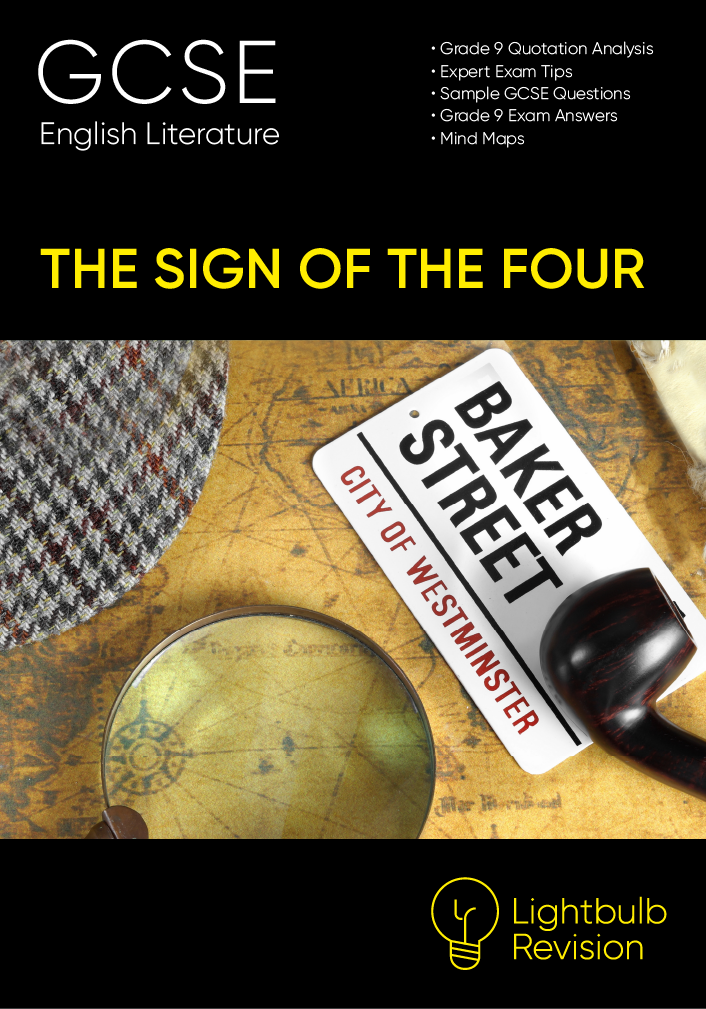Friendship
Exploration of a Theme
The importance of friendship is a theme which runs throughout ‘The Sign of the Four’. Both the protagonist (Holmes) and the antagonist (Small) have bonds of loyalty and friendship which help drive the plot’s action and also reflect ideas within the novel.
‘great powers’
• The friendship between Holmes and Watson is a key element to the novel. Watson is rather in awe of his clever flat-mate, Holmes, describing his ‘great powers’ of deduction.
• This phrase with its admiring adjective ‘great’ is repeated to reflect Watson’s great admiration for Holmes, suggesting that Watson feels humble in comparison. Their friendship is not one of equal intellect.
• Watson’s position as Holmes’ friend allows Conan Doyle to illustrate the brilliance of Holmes’ mind and to ensure that we, the readers, also believe that Holmes is an amazing detective.
‘Count the cost!’
• Watson disapproves of Holmes’ cocaine habit and urges him to consider the consequences of taking drugs.
• The imperative verb ‘count’ reflects Watson’s urgency. This emphasises his deep desire to stop Holmes from becoming ill from the habit and reveals him to be a caring friend.
• The imperative verb also presents Watson as commanding rather than subservient. He might be intellectually inferior of Holmes but he is able to express his opinion freely and forcefully. This suggests that there is an equality in the relationship.
Context: Scientific experimentation during the Victorian era led to wide-spread use of drugs among the middle and upper classes. It was viewed as not only acceptable but was often seen to enhance creativity. Watson’s challenge reflects growing awareness that recreational drug-taking had unpleasant side effects.
‘My dear doctor’ said he, kindly’
• Holmes apologises warmly to Watson after offending him with the casual analysis of his alcoholic brother’s watch.
• This endearment ‘my dear doctor’ is positive. The possessive pronoun ‘my’ shows the closeness between the two and the warmth of ‘dear’ that shows that Holmes is capable of friendship.
• The adverb ‘kindly’ reveals a very compassionate, human quality in Holmes as he tries to soothe his friend’s upset feelings. This has the effect of humanising Holmes, who otherwise would seem as cold as a robot.
‘I welted the little devil’
• Small recounts how he whipped Tonga for killing Sholto.
• The inequality of friendship is clearly seen here as Tonga is punished like a naughty dog. The noun phrase ‘little devil’ is patronising and abusive, linking Tonga to the idea of evil and heathenism.
‘fierce, morose and intractable, though capable of forming most devoted friendships’
• Tonga and people from his race are described in a book which is ‘the very latest authority’ on inhabitants from the Andaman Islands.
• Tonga’s ability for deep enduring friendship seems to be the feature which lifts him above the status of animal. Certainly he is ‘devoted’ to Small, even leaving his native home to accompany Small to cold, unfriendly England.
• Yet there is almost a sense of the animal about his devotion; he is presented rather like a particularly faithful guard dog to his owner, Small.
• Small abuses this devoted friendship, exploiting him at fairs to earn money.
Context: Darwin’s evolutionary theory had caused a great sensation when it was published in 1859. Conan Doyle believed that white Englishmen were the most removed from the original animal state while black people still held animalistic tendencies. This racial evolutionary theory was commonly held and Conan Doyle reinforces these ideas in his presentation of Tonga and also in his novel ‘The Lost World’, where the white explorers are cultured and intelligent and the black character is simple.
‘paroxysm of anger’
• Morstan argues with Sholto about the division of the treasure and suffers a fit of anger which kills him.
• The two men were once ‘bosom friends’ but in the end their argument is so heated and bitter that Morstan dies. Their friendship is eroded and corrupted by their greed and the lure of the treasure.
‘four or none’
• The friendship of the four conspirators at Agra is strong and true.
• The phrase is repeated to illustrate how the four men bonded together. The syntax of the phrase tells the reader that the men are utterly loyal to one another.
‘our pistols rang out together’
• Watson, with Holmes and Jones, fires at and kills Tonga.
• Watson is physically brave here, adding to our positive perception of him.
• There is a sense of teamwork here, a sense of equality with Holmes, as they work together.
• The simple sentence also works to enhance the drama and tension at the end of the river chase.

Grade 9 Analysis
Look at the character in a different way.
Is the novel a celebration of friendship?
Yes: Friendship is at the heart of the novel; even the title ‘The Sign of the Four’ reinforces the bonds of friendship with the determiner ’the’ placing the four conspirators firmly together. The men come as a unit of four people and they do not betray one another. Their friendship is so strong that it transcends background, race and religion and this is no light achievement, especially when seen in the context of Victorian society with its inherent racism.
No: None of the friendships are particularly wholesome ones. Small abuses Tonga, Sholto and Morstan fall out, Miss Morstan and Mrs Forrester’s friendly relationship is undercut by the fact that Miss Morstan is an employee. Even the friendship between Watson and Holmes is more of a plot device than a true friendship. Conan Doyle uses Watson as an audience proxy; Watson allows the reader to experience his emotions and he asks the questions about the mystery that we, the reader, would like to ask. Watson’s position is also one of sidekick rather than friend and is used primarily to highlight Holmes’ intelligence; this fits into the literary genre of a super bright detective with a less able companion which has been used by many crime writers since Conan Doyle.




